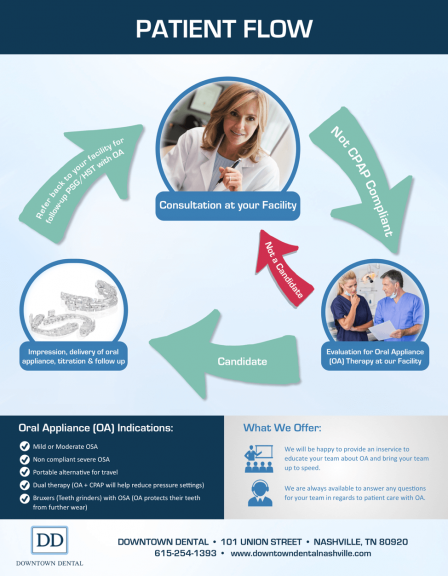Dental Sleep Therapy: Provider Resources
At Downtown Dental, we’re dedicated to delivering the highest quality of Oral Appliances and Sleep Medicine care to your patients. We appreciate your referrals and enjoy working with you. We take a comprehensive and collaborative approach in diagnosing and treating all sleep disorders.
We pledge to provide the highest level of care for your patients and only perform Oral Appliance Therapy once the appropriate testing procedures have been completed and a referring physician’s diagnosis has clearly indicated a need. We feel that some dental providers over-utilize these appliances by either treating snoring as a symptom or ordering home sleep studies without physician collaboration and passing the PSG, which is the gold standard for sleep apnea diagnosis.
There are many dentists located in and around Nashville with a high degree of variability in the level of care they deliver concerning Oral Appliance Therapy. This variability of quality is particular to Sleep Medicine when compared to other subsets of dentistry, in part because of the limited programs that have been available for complete education and training. Dr. Clark has taken more than the required numbers of hours of training in the area of Dental Sleep Medicine for his American Academy of Dental Sleep Medicine Diplomat Exam, and he’s also completed a mini-residency in Craniofacial Pain.

Many of our patients find oral appliance therapy (OAT) to be an effective alternative to CPAP. Instead of the loud respirator and uncomfortable facial mask, patients simply slip on their comfortable oral appliance during sleep and rest soundly through the night. Keep reading or contact our team to find out how a compact oral appliance can help your patient sleep more restfully.
We also pledge to implement and manage a comprehensive treatment plan for your patients. We will communicate this treatment plan with you and educate and empower the patient to commit to the treatment plan, as well as intermittent follow-up visits to address concerns or problems.
TREATMENT SEQUENCE: with prior OSA Dx
- The treatment process involves records, history and clinical exam along with dental impressions of the jaws. Dr. Clark will carefully take a calibrated bite to open the airway with instrumentation to start appliance therapy. If greater than 1 year since PSG, Dr. Clark will administer take-home study for baseline prior to OAT (oral appliance therapy).
- Delivery of appliance with any adjustments for comfort and fit. Instructions for completion of adjunctive sleep logs, and specific instructions on patient-guided titration.
- One month interval checks between months 2-5 for review of sleep logs, physical evaluation and check on the appliance. Possible custom calibration of the appliance for increased efficiency.
- At the completion of the titration phase (4-6 mos.), administration of ambulatory/take-home sleep study to objectively measure appliance therapy results.
- Possible referral back to sleep physician or other medical professionals for further management, or possible of co-therapy to increase effective treatment results.
TREATMENT SEQUENCE: without prior OSA Dx
- Consultation and intake screening exam. Possible administration of take home/ambulatory sleep study. Results to be sent to sleep physician for interpretation.
- Referral for PSG and formal diagnosis from certified sleep center and physician (Dr. Buck will consult with sleep physician on a course of therapy or therapies to best manage patient).
- If appropriate, records, impressions, and calibrated bite for the fabrication of sleep.
- Delivery of appliance with instructions
Possible course of actions after delivery of appliance:
- Referral back to sleep center for adjustment of CPAP and initiation of co-therapy
- If Truly CPAP intolerant (presumes moderate to severe OSA) than sleep physician supported Oral Appliance Therapy with supervision to maximal improvement (MMI) in place of CPAP
- If other nasal airway problems, referral to ENT physician for nasal patency treatment either before or during OAT

OAT Treatment Considerations
Oral appliance therapy (OAT) is very effective, safe and very well tolerated by patients. These appliances are medically tested and certified as effective in the management of mild to moderate OSA. It is critical to understand that “snoring” guards, or other over the counter devices, including snoring remedies are dangerous at best. The disease of OSA is not a social nuisance, but rather a deadly disease if not treated. By simply attempting to treat snoring, a patient may unintentionally worsen the condition, and hasten serious medical complications.
We believe:
- OAT is not intended to supersede or compete with proper management of OSA by CPAP. Some dental sleep treatments are marketed as replacing properly fitted and adjusted CPAP by qualified sleep physicians, this is not in the patient’s best
- Take home studies are a good baseline and tool for progress, should not be substituted for medically supervised
- All suspect OSA should be diagnosed properly by physicians, and management should be a collaborative, team approach for the best results. Poorly-treated OSA, will still lead to very undesirable medical complications, or contribute to other deadly diseases such as diabetes, obesity, hypertension, stroke and cardiovascular
Possible complications are few, but include:
- slight movement of teeth and opening of contacts (space between teeth)
- increase in untreated TMJ related pain such as headaches, jaw and tooth pain, joint pain
- changes in bite making the bite not as uniform as before OAT. These are acceptable complications given the serious nature of untreated or poorly treated chronic OSA. Since Dr. Clark is an expert TMJ dentist, he can assist in treating this condition, which commonly accompanies OSA. If TMJ problems were unrecognized before OSA treatment, OAT may unveil this and require subsequent
